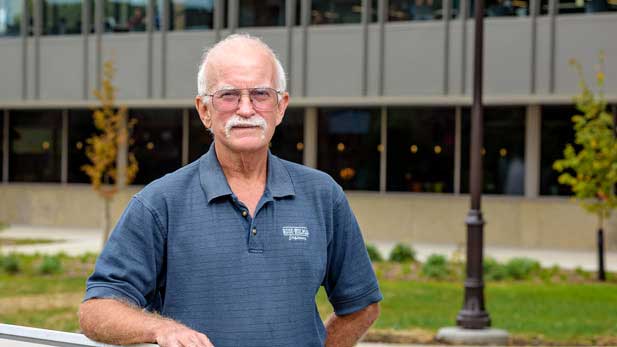Special Events to Reflect Upon Space Exploration Achievements

Dick Osburn had a 36-year career in ground navigation, trajectory operations and flight development for Apollo, Skylab and Space Shuttle missions. While leading NASA’s flight navigation center, he discovered the anomaly that aborted Apollo 13’s plans for a moon landing.
Retired NASA space flight navigation specialist Dick Osburn will discuss the thrills and risks of American space travel during two events at the Hatfield Hall Theater on Thursday, Sept. 20.
Osburn will be featured in a special campus convocation from 11 a.m. to 12:15 p.m. Then, he will give remarks at 7 p.m. that introduce the showing of the movie “Apollo 13” immediately following. The film presentation, originally scheduled for Wednesday, conflicted with other events on campus and was moved to Thursday to allow more students the opportunity to attend.
Both events are free and open to the public. However, advance reservations for the public are required at rose-hulman.edu/Osburn. The convocation will be available for viewing online at rose-hulman.edu/WatchOsburn.
Osburn, a 1967 Rose-Hulman mathematics alumnus, was at the forefront of history as a member of the Johnson Space Center’s Ground Navigation Section for the historic Apollo missions. His involvement started shortly after graduation in a support role for Apollo 7, the first manned Apollo flight, in the fall of 1968. A series of missions followed to establish all of the technology necessary to land a module on the moon’s surface. Then, in the summer of 1969, he helped set a course in NASA’s Mission Control in Houston as Apollo 11 executed the first landing on the moon.
Osburn was the first NASA employee to discover an anomaly in the 1970 Apollo 13 flight and alerted the flight director to the dangerous situation. This caused the mission to be aborted under nail-biting circumstances that were documented in the Ron Howard-directed “Apollo 13” movie.
Osburn’s leadership role in U.S. space exploration continued with NASA’s Skylab missions and early Space Shuttle flights, and he became head of the Ground Navigation Section in 1980. Within five years the Marion, Ind., native was leading the Trajectory Operations Group for Rockwell Space Operations Company, which took over management of Space Shuttle flights. Later, he was director of Flight Design and Dynamics, an organization of more than 600 engineers and technical support personnel that was in charge of pre-flight planning, mission support and maintenance of supporting computer software.
His 36-year career also included assisting in the formation of the United Space Alliance, a consortium of commercial entities led by Boeing and Lockheed, and the Orbiter Element, a group responsible for the development and maintenance of Space Shuttle flights. He retired in 2003.
Dick and his wife Ruth live near Houston.